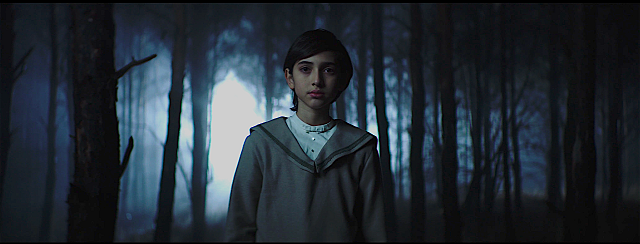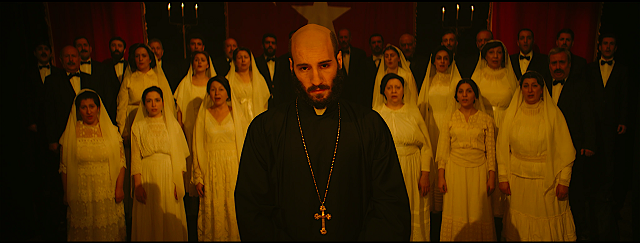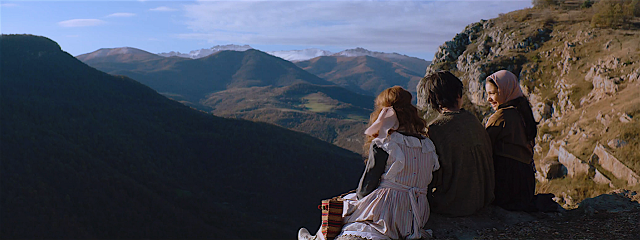The Armenian Weekly. Filmmaker Arman Nshanian has unlocked a critical and tragic period in Armenian history with his homage to musical pioneer Komitas in his directorial debut Songs of Solomon.
“The two massacres leading to the genocide are often overlooked, and it was interesting and important to educate an audience about [that] history,” said Nshanian in a recent interview with the Armenian Weekly of his 2020 production and Armenia’s official submission in the International Feature Film category for the 93rd Academy Awards.
Songs of Solomon is a chilling and emotional film set in Constantinople (1881 – 1915) on the heels of the Armenian Genocide. It follows Komitas’ friendship with a young Turkish girl (Sevil) and her Armenian best friend (Sona) during the Hamidian Massacres—a ruthless ethnic cleansing campaign against hundreds of thousands of Christian Armenians orchestrated by Ottoman Emperor Abdul Hamid II.
“We [Armenians] have a lot of history to show the world,” said Nshanian. “We don’t have to make films or do propaganda against Azerbaijan or Turkey because the truth is the truth. As long as we keep it truthful, the story speaks for itself,” explained the filmmaker, who worked closely with historians during the film’s four-year production process.
Read also
Based on a true story from his dear friend Sylvia Kavoukjian, Songs of Solomon is a dream realized. “She sent me a story about her grandmother, and I just fell in love with it,” said Nshanian, adding that his fellow former Anoush Opera cast member also granted him the creative freedom to produce it.
The actor-turned-film director said he didn’t feel comfortable passing such a sensitive story to anyone else in the industry who may have a different vision. “I knew that if I controlled everything I would know that I did my best,” said Nshanian.
Songs of Solomon was recently acquired by Cloudburst Entertainment and is expected to premiere globally in early 2021. Nshanian also worked with Asko Akopyan of Oscar Gold Productions and two-time Academy Award-winning producer of Green Book Nick Vallelonga of Vallelonga Productions.
While this was Nshanian’s first time directing a film, he is a 20-year veteran of the arts. A natural performer, his parents opened one of the first Armenian theatrical companies in Los Angeles back in 1982 where thousands would gather to enjoy professional classic American and Armenian productions. At 19, he discovered his talents for theater arts after he was dragged to acting lessons by his mother. He studied with legends like Howard Fine, Uta Hagan, Eric Morris and Stella Adler. “I just went wild with it,” Nshanian said, smiling as he reminisced about the start of his career.
Nshanian would eventually move to Austria to study opera at the Vienna Conservatory of Music and earned his Masters of Fine Arts from the Komitas State Conservatory of Yerevan. That’s when he started directing opera, theatre and television soap operas.
Nshanian is also a musician, and like many young Armenians, was inspired by Komitas Vartabed. That is why he felt compelled to bring the musical genius to life in Songs of Solomon. The archbishop’s beloved and most sacred songs are interwoven with the horrifying fate of the Armenian people throughout the agonizing film. Nshanian purposefully adopted a risky creative direction by building Komitas’ character in an elusive way and hiding him out of focus throughout the film. “It was so important that I did not show Komitas fully until the end. Everyone unconsciously has their inner feeling of how historical figures should look. I had that inner responsibility of bringing such a figure as Komitas’ to life,” he explained.
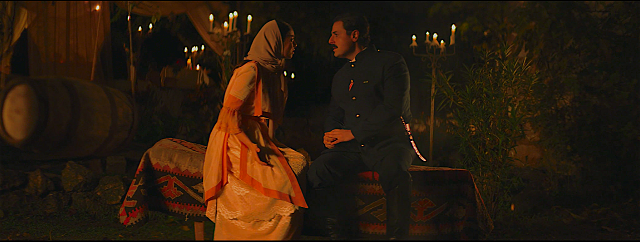
Arman Nshanian as “Osman” and Arevik Gevorgyan as “Sevil” (Production still provided by Cloudburst Entertainment)
Nshanian also served a supporting role as Osman. He unconsciously guided screenwriter Audrey Gevorkian to build Osman’s character in his likeness. Starring in the film wasn’t part of his original plan; his role was actually one of the final additions to the cast. Casting directors had a tough time finding an actor who gave Osman an authentic conscience. “It was my righteous obligation as a director to make sure that, because I’ve taken on two roles, no one else would be sacrificed because of my decision,” said the humble artist as he explained the complexities and challenges that came with the dual roles. He always insisted that the other actors were prioritized in the production process and that he was satisfied before filming his own scenes, which took twice as long to film because he would head towards the monitor to watch the playback after every take. “I understood it’s difficult to detach yourself from your ego,” he reflected, adding that he would often seek the guidance and constructive criticism of his wife and fellow crew members.
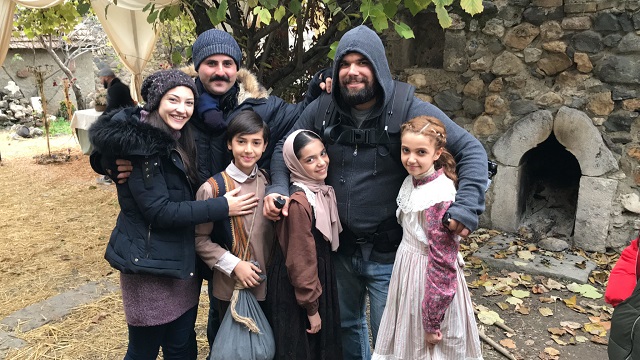
Nshanian pictured with young cast members (Behind the scenes photo provided by Cloudburst Entertainment)
Nshanian’s creative ventures have always centered around Armenia. He says it’s his honor to give back to his homeland by creating hundreds of jobs and stimulating the economy through his creative projects. He works closely with the Ministry of Culture and National Cinema Center of Armenia to bring global recognition and prestige to his Armenian heritage.
As a passionate artist and Armenian patriot, Nshanian said he strives to create films that will elevate humanity and ensure that people truly understand the Armenian people. “That does not mean making us look good or righteous,” he noted. “It’s about really getting people to understand who we are, where we come from and the issues that we’ve had to deal with for thousands and thousands of years.”
Nshanian hopes to inspire diasporans to salvage their culture and history through the arts. He trusts that Songs of Solomon will inspire Armenians to share the stories of their ancestors as a way to preserve our history for future generations. “We’re not only Christians. We are the people of Great Hayk,” urged Nshanian. “Once you lose sight of your past and history, then you lose track of your roots.”
Nshanian, who was in Armenia and Artsakh during the Artsakh War, says Armenians cannot lose hope during this divisive time. He attributes part of Armenia’s loss in the Artsakh War to the lack of attention and focus on culture. “A race can only go downhill when they lose sight of their culture. It’s the only thing that truly differentiates ourselves from others. We’re really lost right now, I hope we take the time to come back to our roots.”
Kristina Ayanian
Main caption: Production still provided by Cloudburst Entertainment




















































